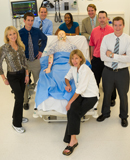
Educational Innovation Award
When Ellen Brock, M.D., M.P.H., Associate Professor of Obstetrics and Gynecology, became Director of the Center for Human Simulation and Patient Safety in 2008, it was tucked away in the former NICU in Main Hospital. As Dr. Brock led the development of Center services and recruited staff, the Center moved to 5400 square feet in North Hospital.
This spring, just five years since its beginning, the Center moved to its new home in the McGlothlin Medical Education Center, with seven staff members and 25,000 square feet of state of the art simulation spaces over two floors of the building.
“The Center, at its core, was designed to bring all of the individual programs and departments and their simulation projects together for the betterment of the entire institution,” says Mary Alice O’Donnell, Ph.D., Associate Dean and Director of Graduate Medical Education (GME). “These silos have gradually come together for the common good. This has been due mainly to the Center’s collaborative style and willingness to work towards excellence.”
“As skill deficiencies and opportunities are identified, simulation approaches are developed to address them. Successful approaches become integrated into the regular curriculum,” explains David Chelmow, M.D., Professor and Chairman, Department of Obstetrics and Gynecology. A simulation designed to improve emergency Cesarean deliveries “greatly enhanced our multidisciplinary teamwork and ability to respond to emergencies.”
The Center’s work with the GME “Walk the Walk” simulation experience for 140 new first-year residents each of the last four years is an example of the collaborative partnerships the Center has formed to support improved training and patient-centered care. This orientation is designed to assess and reinforce key skills that all residents are expected to perform, regardless of specialty, as they begin internship.
The Center’s development and execution of interdisciplinary training for VCU Medical Center’s code team, including physicians, nurses, pharmacists, respiratory therapists, chaplains and other health care professionals, allowed team members to improve interaction in these fast-paced, high-stakes situations. VCU Medical Center has subsequently seen a significant improvement in code survival in calendar year 2013.
Dr. Brock’s team develops novel uses of simulation to record and map hospital team work processes so that potential risks for failure in the system can be identified and avoided through re-engineered practice and communication procedures. The resulting improvements enhance the experience and safety of our patients.
“She is a thoughtful, approachable, and certainly innovative educator, who has partnered with colleagues across the enterprise to impact the quality of care and the quality of education at VCU Medical Center,” states L. Dale Dunlow-Harvey, M.S., R.N., Fellow of Patient Safety, and Director Performance Improvement, VCUHS.
“As the practice and education of health professionals has entered a new era defined by competency and quality, simulation-based training has become a dominant modality for education. Dr. Brock and her team have led or supported VCU’s efforts to be on the vanguard of these efforts,” agrees Alan Dow, M.D., M.S.H.A., Macy Faculty Scholar, Assistant Vice President of Health Sciences, Assistant Dean of Medical Education and Associate Professor of Internal Medicine.
As Ms. Dunlow-Harvey states, “No one embodies principles of innovation, or has executed them more eloquently … Dr. Brock is not constrained by tradition; rather, she seeks unique and innovative approaches, engaging learners and colleagues – and taking them on a journey with her.”